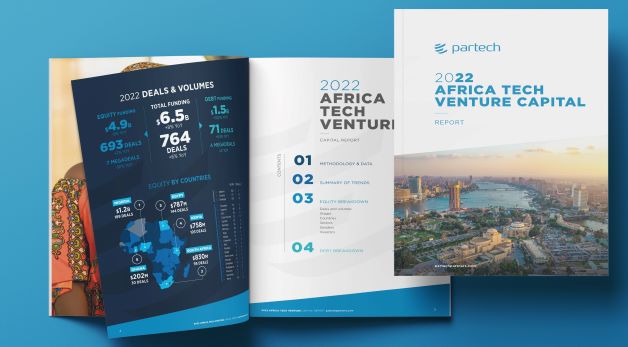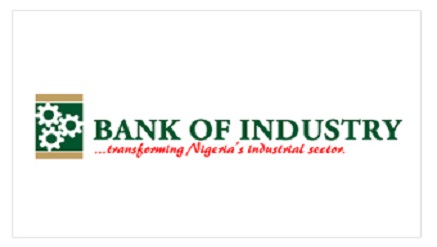E-Financial
Resilient African Tech Ecosystem Still Growing With $6.5 Billion Raised In 2022

Partech Africa, the VC fund dedicated to technology startups in Africa, has issued its annual report on Africa Tech Venture Capital.

The report, which aims to provide a practical picture of the state of the ecosystem, revealed that despite the global VC downturn, the African tech ecosystem grew faster than all other markets globally.
Total funding invested into tech startups on the continent reached $6.5B, an increase of 8% vs 2021, spread across 764 deals – compared to 724 rounds in 2021.
The report, consisting of disclosed and confidential deals, saw debt funding more than double in volume, reaching $1.55 billion through 71 deals [65% YoY growth]. In comparison, equity rounds showed a slight decline, as 653 African tech startups raised $4.9B [-6%] in 693 equity rounds [2% YoY growth].
Focusing on equity funding, the report revealed the ecosystem was still accelerating during Q1 and Q2 of 2022 compared to 2021, with the YoY comparison showing Q1 and Q2 at +127% YoY and +83% YoY, respectively.
However, the global VC slowdown stifled growth in activity in Q3 [-65% YoY] and Q4 [-35% YoY]. In 2022, fundraising activities remained flat across all stages. At $1.4M, Seed+ ticket sizes averaged higher in 2022 [+12% YoY], while Series A remained the same at $8.5M.
Later stages reverted to 2019 levels, as Series B and Growth round sizes dropped by -23% and -50% YoY, respectively. In addition, 2022 witnessed a significant reduction in the number of megadeals [over 100M], with only seven deals compared to 14 in 2021.
Speaking on the launch of the annual report, Tidjane Deme, General Partner at Partech, said: “2022 was a particularly challenging year for the venture ecosystem worldwide, as venture and growth investors scaled back their investment by a third.
“However, by comparison, our report revealed that the African tech ecosystem showed great resilience, as more investors have doubled their commitment to the continent by investing in local teams and funds dedicated to the market, proving to be the best way forward.”
Overall, Nigeria, South Africa, Egypt and Kenya remain the top investment destinations in Africa, with a share of total volume staying relatively steady at 72%.
Nigeria retained the top rank, bringing in $1.2B in capital, despite a decline of 36% from 2021; South Africa, Egypt, and Kenya each attracted over $0.7B in funding, with Ghana completing the top 5 with just over $0.2B. Overall, 28 countries attracted equity funding in 2022, 13 of them in Francophone Africa.
In light of the market downturn, the report’s findings also revealed that Fintech, which has historically attracted sizable investments, was the most impacted by the slowdown in the number of large rounds.
However, fintech remains the most funded sector in Africa, across all sources of capital, with 39% of the total equity volume [$1.9B] and 45% of the total debt volume [$691M].
Other sectors have experienced substantial growth and gained a meaningful share of the equity funding activity this year, most notably Cleantech, which made a big comeback with 18% of total equity funding at $863M [+347% YoY] but also 39% of the total debt funding at $605M.
The report’s findings also show:
- Female-founded startups raised 22% of all equity rounds in 2022, up 2 percentage points from 20% in 2021. They also contributed $644 Million or 13% of the total equity funding, down 3 percentage points from 16% in 2021.
- Outside of the top 4 countries, Ghana ($202 million), Algeria ($150 million), Tunisia ($117 million) and Senegal ($105 million) were the only other countries that broke the $100M funding mark.
- Despite a slowdown in the growth rate of equity investors, Africa’s tech ecosystem attracted 1,149 unique investors for the first time [+29% YoY vs 2021]. African tech has seen more investors committed, with 89 participating in 5 or more deals [compared to 65 investors in 2021].
- The number of debt investors active on the continent is growing 2.5x YoY, with a good mix of local debt institutions, international lenders with emerging market vehicles and Development Finance Institutions.
Cyril Collon, General Partner at Partech, added: “Much of our methodology has remained the same over the years, and we, therefore, can provide a snapshot of how the African continent has evolved over the years. Nigeria and the fintech vertical have remained at the top spot; however, in an environment where equity funding is more challenging, debt has proved to be a solid alternative source of African tech startups in 2022, which signals a maturity within each sector.”
Headquartered in Dakar, Partech Africa is the largest VC fund dedicated to technology startups in Africa.
With a focus on Late Seed, Series A and B equity rounds in startups which are changing the way technology is used across multiple sectors, including education, mobility, finance and healthcare, the VC has, to date, invested in 17 African startups, such as Wave and TradeDepot.
Using the same methodology as previous years, the seventh Partech Africa annual report on African tech start-ups only includes equity rounds where the total amount is higher than US$200K.
E-Financial
CBN Expresses Concern Over Foreign Investments in Nigeria Fintechs

The Central Bank of Nigeria in its 2025 Fintech Policy Insight Report, has raised concern over Nigeria’s fintech sector heavily dependent on foreign investment, exposing it to swings in global markets.

The report said the sector has shown resilience despite global economic pressures, but warned that reliance on external capital leaves it vulnerable to market fluctuations.
It would be recalled that startups in the country raised $520m in equity funding in 2024, down from about $747m in 2019, when Nigeria captured roughly 37 per cent of all African startup investment.
This performance, amid significant global macroeconomic gyrations, underscores Nigeria’s position as a key hub for financial innovation. The sharp rise in interest rates in advanced economies during 2022 contributed to a slowdown in venture capital funding.
“These dynamics highlight the importance of developing domestic funding avenues, such as leveraging Nigeria’s capital markets, to reduce currency risk and sustain fintech growth,” the apex bank stated.
Olayemi Cardoso, CBN Governor, said Nigeria is undergoing a rapid and significant financial evolution. Over the past decade, the nation’s fintech landscape has grown from a handful of startups into one of Africa’s most vibrant innovation ecosystems.
“Even amid global economic headwinds, Nigerian fintech firms continued to attract investment and drive change. Today, with improved stability of our currency and domestic economy, it is clearer than ever that financial innovation can advance inclusion at scale,” the executive commented on the report.
In addition to funding, the central bank underscored Nigeria’s continued leadership in digital financial infrastructure. More than 25 per cent of all electronic transactions in Africa’s most populous nation are processed via real-time payment channels, with close to 11 billion transactions processed in 2024, up from five billion in 2022. The report described Nigeria’s instant payments platform, NIBSS NIP, as among the most mature and widely adopted globally.
The report also mentioned the need to strengthen system integrity and reputation, pointing to compliance reforms, anti-money laundering supervision, and consumer protection measures as key priorities for sustaining investor confidence.
By focusing on domestic funding, regulatory modernisation, and innovation infrastructure, the CBN aims to position Nigeria not only as a fintech front-runner but also as a rule-setter whose regulatory lessons are relevant to peer emerging and high-growth economies globally, the central bank said.
Stakeholders surveyed by the CBN also cited compliance costs as a significant challenge to innovation. According to the report, 87.5 per cent of respondents said that the cost of meeting regulatory and risk requirements significantly impacts their capacity to innovate, while delays in product approvals and regulatory timelines also remain major bottlenecks.
The report noted that 62.5 per cent of fintech firms plan to expand regionally, and there is strong support for regulatory pass-porting frameworks to enable compliant expansion into other African markets. However, the CBN warns that such cross-border growth requires a stable funding base and coordinated regulation.
E-Financial
UBA’s Easy and Instant Account Opening Thrills Returnee

After a few years abroad, I returned to Nigeria and faced a dilemma. Let me tell you all about it.

UBA
A few days ago, I was dragging my luggage through Murtala Muhammed International Airport. Everything felt bright and beautiful. Not necessarily in aesthetics, but in the vibrant colours, sounds, and energy all around. After three intensive years in the UK, I was finally back home. Ready for the hustle and bustle of Lagos life, and yes, the comfort of my parents’ home.
The plan was simple. Settle down and get my life on track. I’d sorted the job, and I had my person. But then came my dilemma. Money!. This doesn’t mean I was short of it or had too much of it. The real issue is where to actually keep and manage it in this country with daily dramatic happenings. With just two weeks left before I resumed at my new workplace, I had no time for long queues, endless paperwork, or the classic “Nigeria bank stress.” So, I needed an account, and I needed it fast.
So I turned to my best friend, Google, and typed, “Instant account opening in Nigeria.”
In less than a second, I was redirected to the United Bank for Africa instant account opening portal. A few taps later, and I had a fully functional account. Just like that. I could receive my funds, transfer my funds, and start building my financial life here again.
In less than a second, I was redirected to the United Bank for Africa instant account opening portal. A few taps later, and I had a fully functional account. Just like that. I could receive my funds, transfer my funds, and start building my financial life here again. Talk about ease, and this beautiful experience truly exemplified that definition
I was genuinely amazed. It felt too easy, almost suspiciously easy. But it was real, I mean, really soft like they were just thinking all about me while developing this new feature.
If you’re like me and pressed for time, avoiding unnecessary stress, or just ready to sort your finances without the hassle, consider this your sign.
UBA’s instant account opening is a game-changer. No queues to cut into your precious time. Just you and your phone, minutes away from being banked.
Get started here: https://aop.ubagroup.com
Trust me, if I could do it between unpacking and settling in, you can do it too. Your future self will thank you.
E-Financial
BOI Secures CBN Nod for Sharia Banking, Unlocks Ethical Funding Boom

Bank of Industry (BOI) has received Central Bank of Nigeria (CBN) approval to launch a Non-Interest Banking (NIB) Window, expanding ethical financing for underserved businesses nationwide.

BOI
The move positions BOI to mobilise Sharia-compliant funds, finance assets and raw materials without interest, and target MSMEs plus high-impact sectors previously sidelined by conventional loans.
Divisional Head of Public Relations, Theodora Amechi, said the window aligns BOI with social goals, boosting real economy support and sustainable industrial growth.
MD/CEO Dr. Olasupo Olusi hailed it as a “pivotal moment,” enabling the bank to serve faith-sensitive enterprises shunning riba-based loans.
Analysts see it as CBN’s vote of confidence in BOI’s governance, set to spur innovation and inclusive financing for Nigeria’s ethical business segments.
Established in 1959 as Nigeria’s top Development Finance Institution, BOI now strengthens its drive for broad-based economic transformation.

 General News3 days ago
General News3 days agoGlobacom Donates ₦1Bn to Lagos State Security Trust Fund

 Telecom3 days ago
Telecom3 days agoAirtel Nigeria Commits to Upgrade of its Network Infrastructure for Improved Quality of Service

 E-Business3 days ago
E-Business3 days agoPwC Reveals AI Scaling Gap Slows Africa’s Digital Transformation

 E-Financial3 days ago
E-Financial3 days agoEcobank Profit Jumps 29 Percent to N950Bn

 News3 days ago
News3 days agoCIoD, NIPSS Partner to Deepen Governance, Leadership Standards

 News3 days ago
News3 days agoNRS Chairman Outlines Ways Nigeria can Move from Potential to Economic Prosperity

 News3 days ago
News3 days agoTrump Says He Made no Mistake Sharing Video Depicting Obamas as Apes

 General News3 days ago
General News3 days agoWIEG to host Nigeria’s first International Investment Summit in Lagos

















